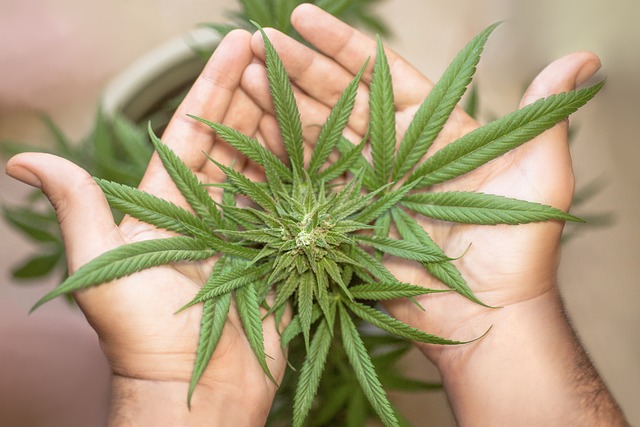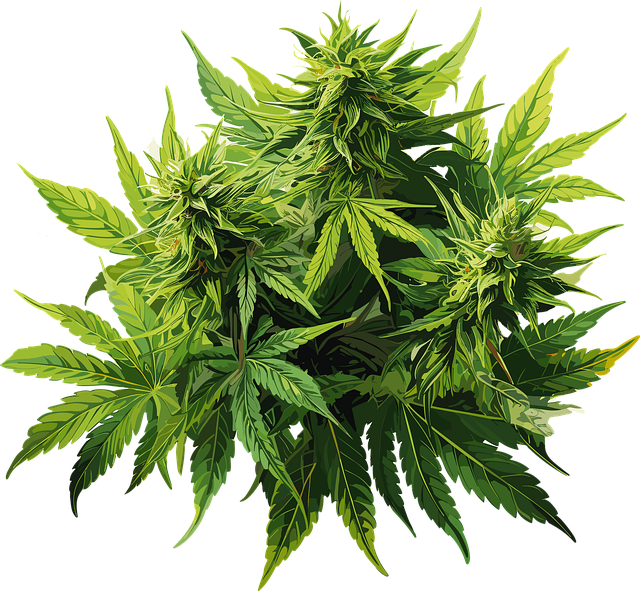THCA, or tetrahydrocannabinolic acid, a non-psychoactive precursor to THC and subject of therapeutic interest, has become a key focus due to its legal status in New Mexico. With the 2018 Farm Bill and New Mexico's Lynn and Erin Compassionate Use Act, THCA flower is legally permissible in the state when it contains less than 0.3% THC on a dry weight basis. This legislative framework, alongside state initiatives like the Psilocybin Natural Referendum and the Cannabis Regulation Act, reflects New Mexico's commitment to advancing cannabinoid research for medicinal purposes. The therapeutic potential of THCA, which is naturally present in raw cannabis and can be converted into psychoactive THC with heat, has sparked interest due to its lack of strong psychoactive effects. Consumers in New Mexico can legally access THCA products, leading to a growing body of research into its medical applications. Users should be aware that improper handling can lead to mild psychoactive effects and that side effects like dry mouth and red eyes are typically mild. Education on the correct usage, storage, and handling of THCA flower is crucial for consumers to navigate New Mexico's regulated cannabis market safely and effectively.
Exploring the multifaceted nature of THCA flower, this article delves into its emergence as a significant cannabinoid, its legal standing particularly in New Mexico, and the breadth of its effects on health. As consumers increasingly seek out this non-psychoactive compound for its potential wellness benefits, understanding THCA flower’s side effects becomes paramount. We will navigate the science behind THCA, its interaction with the endocannabinoid system, and the therapeutic applications it may hold. With a focus on safety, we highlight dosage recommendations and how to store THCA flower to preserve its efficacy. Additionally, we address the psychoactive effects of related cannabinoids, adverse reactions that might occur, and the importance of lab testing for product purity. This comprehensive guide also touches on the cultivation process, legal considerations under New Mexico’s laws, and the potential long-term implications of regular use. Through consumer experiences and scientific research, this article aims to provide a clear understanding of THCA flower’s role in health and wellness.
- Understanding THCA Flower and Its Legal Status in New Mexico
- The Emergence of THCA as a Prominent Cannabinoid
- THCA Flower Side Effects: What Consumers Should Know
Understanding THCA Flower and Its Legal Status in New Mexico

In the realm of cannabinoids, THCA, or tetrahydrocannabinolic acid, represents a non-psychoactive precursor to the more well-known compound THC. THCA flower, which contains this cannabinoid in its raw form, has garnered attention for its potential therapeutic properties. As of recent legislation updates, understanding the legal status of THCA flower in New Mexico is crucial for consumers and businesses alike. In New Mexico, THCA, like other cannabinoids found in hemp, is legal provided it contains less than 0.3% THC on a dry weight basis, as per the 2018 Farm Bill and subsequent state regulations. However, New Mexico’s specific laws can be nuanced, with the Lynn and Erin Compassionate Use Act allowing for medical cannabis that includes THCA, offering relief to patients with qualifying conditions. This act, along with the Psilocybin Natural Referendum and the Cannabis Regulation Act, reflects a progressive stance on cannabis-related substances within the state, positioning New Mexico as a leader in the exploration of cannabinoids’ medicinal benefits. Navigating the legal landscape for THCA flower involves staying abreast of both federal and state regulations, which can evolve over time, to ensure compliance and safety.
The Emergence of THCA as a Prominent Cannabinoid

As interest in the therapeutic properties of cannabis has surged, THCA or tetrahydrocannabinolic acid, a non-psychoactive precursor to THC, has garnered significant attention within both scientific and consumer circles. THCA is found in raw cannabis plants and is only psychoactive when decarboxylated, meaning it loses a carboxylic acid group through heat, which converts it into THC. The emergence of THCA as a prominent cannabinoid has been fueled by anecdotal and scientific reports suggesting a wide range of potential health benefits without the psychoactive effects typically associated with THC. In New Mexico, where legislative efforts have led to more progressive cannabis policies, the exploration of THCA’s properties is particularly noteworthy given its legal status. Consumers in New Mexico can legally access raw cannabis products containing THCA, which has opened up new avenues for research and self-experimentation. This legality allows researchers to study THCA’s effects and its potential applications in medicine, while consumers explore its benefits firsthand, contributing to a growing body of empirical data on this novel compound.
THCA Flower Side Effects: What Consumers Should Know

Consumers interested in the therapeutic properties of cannabis often explore various compounds, one of which is Tetrahydrocannabinolic Acid (THCA). As THCA is the precursor to THC, the psychoactive component of cannabis, it’s important for users to understand its effects and potential side effects. In New Mexico, where THCA-rich products are legal, consumers should be aware that while THCA itself does not induce psychoactive effects like THC, it may have intoxicating properties when converted or consumed improperly. Side effects associated with THCA flower consumption can include mild psychoactivity, dry mouth, and red eyes. It’s also worth noting that individual tolerance levels vary, and the side effects experienced can differ based on dosage, strain potency, and individual physiology. Users are advised to start with small doses to gauge their reaction and avoid unwanted effects. Additionally, as THCA is metabolized into THC and CBD upon heating or decarboxylation, it’s crucial for users to understand how their preparation methods can alter the compound’s effects. Education on proper dosing, storage, and handling of THCA flower is key for a safe and positive experience in New Mexico’s legal cannabis market.
In conclusion, the rise of THCA flower as a cannabinoid of interest within the realm of cannabis products has prompted a closer examination of its properties and potential side effects. As discussed, understanding the legal status of THCA flower, particularly in New Mexico where it is permitted, is crucial for consumers. The emergence of THCA as a prominent compound has brought to light both its therapeutic benefits and the need for careful consideration of its side effects. It is clear that while THCA offers a non-psychoactive alternative with promising wellness applications, it is not without its effects, which can include dizziness, anxiety, and altered blood pressure, among others. Consumers are encouraged to approach THCA flower with informed discretion, recognizing the importance of dosage and individual sensitivity. As research continues to evolve, so too will our understanding of how THCA interacts within the body, ensuring a more comprehensive approach to its use and safety.
